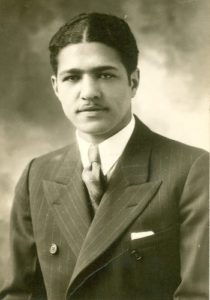
John Thomas, 1929
*John Frederick Thomas was born on this date in 1908. He was a Black diplomat and administrator.
Thomas was from Minneapolis, Minnesota. His father was a Black man from New Bedford, Massachusetts, and his mother was Swedish. They met in Mankato, Minnesota, and as parents, they greatly influenced his life. According to Thomas, his father was very much a “race man,” one who touted independence for the “colored” person, yet he felt that his son would need a white “benefactor” to succeed. Minnesota was a state that was less than one percent African American when Thomas was a young boy. Consequently, he found himself in a world of Jewish, Italian, and Scandinavian immigrants.
After finishing at Minneapolis North High School, Thomas graduated from the University of Minnesota in 1929. The Great Depression compounded the racial backlash of employment opportunities for him. Additionally, whites and Blacks both viewed him as “different.” Considered a minority in white circles and accused of trying to “pass” by Blacks, Thomas experienced a restlessness that would guide him as a servant of the global human family.
In the early thirties, he taught college in North Carolina and other southern areas. He worked as a waiter, played semi-pro basketball, and completed his master’s degree. Thomas met and befriended Gordon Parks, Oscar Pettiford, Hilda Simms, and others during these years. In 1935, he accepted a position in the Boy's athletic program at the Phyllis Wheatley Settlement House in Minneapolis. Though well-educated, the settlement house atmosphere gave Thomas a forum to understand the meaning of social welfare better. Thomas became very active in helping the needy. He also met many notable Blacks who stayed at Phyllis Wheatley due to racism in Minneapolis’s hotels, including Langston Hughes, Paul Robeson, and Marian Anderson.
During this, he married his wife Harriet; the couple had two daughters, Judith Ann and Susan. It was also here that Thomas began a lifelong relationship with Hubert Humphrey. Though commissioned and ready for active duty in Europe with the Army in 1944, he was sent to Camp Lee, Virginia. After the war, Thomas learned of the relief effort in Europe. One year later, he left for England and Germany and did not return to America for twenty years. In October 1945, he began working for the United Nations Relief and Rehabilitation Agency. Starting in their welfare office, his team brought thousands of Polish refugees back to Poland after the fall of Nazi Germany. When the Iron Curtain fell in 1948, many Jews wishing to immigrate to Israel were detained by England. Thomas was instrumental in developing a global underground railroad for them (literally by truck) through France and on to Israel.
Throughout the Russian invasion of Eastern Europe (1956), he and his UN team were at the Austrian border working twenty-hour days, ensuring that over 200,000 refugees crossed into safety as the Russian tanks rolled through Hungary. As director of the Cuban Refugee Program under President Kennedy, Thomas was responsible for the safe passage of over 13,000 Cuban children, avoiding intended trips to communist countries from Castro’s Cuba in 1963. During the Vietnam War between the Tet Offensive (1968) and 1972, he organized settlements and living facilities for millions of Vietnamese people.
It is estimated that John Thomas saved over five million lives in his forty-year career. Retired in 1978, Thomas was the first Black to head an international organization. He was a global emissary of the people who focused on the needs of individuals in times of crisis worldwide. John Thomas died on September 20, 2002, at 95.
Hamline University
Mick Caouette, Producer
Humphrey Documentary Project
St. Paul, Minnesota 55104